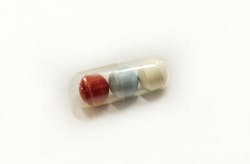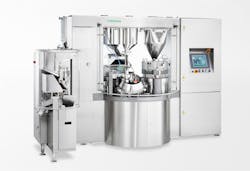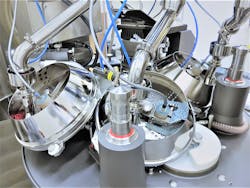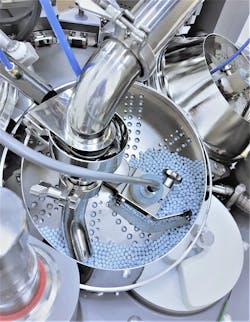Case Study: Turning 1 into 3 — more flexibility in capsule filling
Tablets filled into capsules are enjoying increasing popularity in the pharmaceutical market. One reason for this is that encapsulated tablets are much easier for people to take. Also, some tablets could not be administered without a protective capsule because of their aggressive effect on the mucous membranes of the mouth and stomach. Pharmaceutical manufacturers are now solving this problem by filling the coated tablets into a capsule that dissolves in a controlled manner after being ingested.
This trend, however, confronts pharmaceutical processors and contract manufacturers with new challenges regarding their equipment. Global pharmaceutical contract development and manufacturing organization Recipharm was no exception, and a customer approached Recipharm with a special request: The customer wanted Recipharm to fill three different colored tablets of the same size into one capsule.
“The customer project was and still is a novelty in many respects,” said André Trommer, supervisor mechanic at Recipharm. "We have never before filled several tablets into one capsule. We did not yet have the necessary machine in our production facility. So, we had to come up with a solution that was technically feasible and has a small footprint."
Long-standing partnership breaking new ground
Recipharm (formerly Consort Medical) and Syntegon (formerly Bosch Packaging Technology) are old acquaintances with a long business relationship. At its German locations in Zwickau, Monheim and Wasserburg, Recipharm produces pharmaceutical products for customers all over the world. Syntegon's GKF capsule filling machines have been in use at those locations for more than 30 years, with the most recent installation — a GKF 2500 ASB 100% capsule filling machine — taking place at the beginning of 2017.
The GKF 2500 is equipped with an automatic troubleshooting system and a capsule weighing machine. With an output of up to 150,000 capsules per hour, the GKF 2500 is suitable for powders, micro-dosing, pellets and liquids. The exact filling quantity is pressed into a capsule via a dosing disk before the integrated checkweigher examines each individual capsule and sorts out any that are incorrectly filled. Thanks to the modular design of the machine, products with changing parameters can be quickly processed and precisely dosed. Recipharm has so far used the GKF 2500 primarily for pellets and powder products. Moreover, Recipharm fills pellets in combination with a tablet using the existing tablet station and the retrofitted pellet station. The GKF 2500 is also suitable for filling tablets and micro-tablets into capsules — but up to now, only with one tablet station.
All good things come in threes
When the customer contacted Recipharm, engineering specialist Jens Muhsold soon realized he wanted to give the existing GKF 2500 a try. “I have been working with the GKF platform for over a quarter of a century and still have great confidence in the quality and reliability of the machine and its manufacturer,” Muhsold said.
Recipharm ultimately decided to tackle the demanding project together with Syntegon and to upgrade the capsule filling machine for the new customer project.
“We needed a creative solution, which, in addition to the filling itself, also took into account the limited space available on the machine,” said Muhsold. “This project depends on the successful upgrade. Hence, the pressure on both us and our colleagues at Syntegon was very high. Flexibility was a priority throughout the entire project. And the Syntegon team truly demonstrated its flexibility.”
Dual control for quality assurance
Although the three tablets contain different active ingredients, they are identical in size and weight. The only difference is their different colored coatings. Therefore, it was important to ensure that only one of each tablet ends up in each capsule. The existing tablet station had already proven its worth in practice due to its reliable dosing process. Mechanical filling via a dosing disk makes sure that only the desired number of tablets reach the capsule base. In the unlikely event of a tablet getting stuck in the chute, the integrated gravimetric weighing cell automatically issues an alert.
To be entirely on the safe side, the identical weight of the tablets requires a further control stage. Since the space inside the capsule filling machine was already used up by the three tablet stations, the second step had to be transferred. The color inspection of the tablets is therefore not carried out on the GKF 2500, but on the downstream blister machine by means of color recognition.
"We also looked for the best possible solution for this step together — and found it by efficiently using an existing technology," said Trommer.
Teamwork for flexible problem-solving
In the meantime, extensive tests have confirmed the reliable and high quality of the dispensed capsules. And in the future, Recipharm will be able to process capsule sizes 0 and 00 with different tablet sizes on each of the three tablet stations of the GKF 2500. What sounds simple in retrospect actually required a lot of courage and commitment from both Recipharm and Syntegon within a short time frame.
“The task was tricky because there were no parameters for comparison with previous projects. However, the tests proceeded without any problems. I am very satisfied with the technical implementation and the commitment of the entire service team," said Muhsold.
The upgrade of the GKF 2500 from one to three tablet stations was a first for both Recipharm and Syntegon. Nevertheless, the project partners completed the conversion in around three weeks, during which time, three Syntegon service technicians were on duty at the Zwickau plant. In this way, a specific customer inquiry turned into a challenging project with future potential. Recipharm can now fill various tablets into capsules, and Syntegon can offer the right equipment for a growing market trend.
Andreas Hermann is service sales manager for Syntegon Technology. Syntegon Technology is a leading global process and packaging technology provider. Formerly the packaging division of the Bosch Group, the company, headquartered in Germany, has been offering complete solutions for the pharmaceutical and food industries for more than 50 years. Fields of application in the pharmaceutical industry include the production, processing, filling, inspection and packaging of liquid and solid pharmaceuticals. In the food industry, the portfolio includes process technology for confectionery as well as packaging solutions for dry foods, frozen foods and dairy products.
Syntegon Technology
About the Author
Andreas Herrmann
Andreas Hermann is service sales manager for Syntegon Technology. Syntegon Technology is a leading global process and packaging technology provider.



